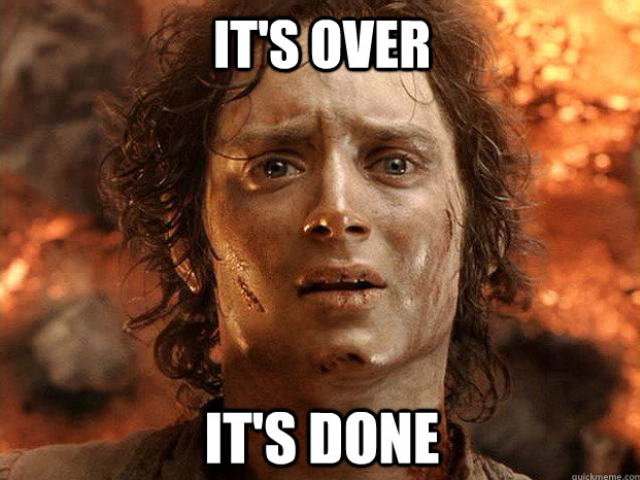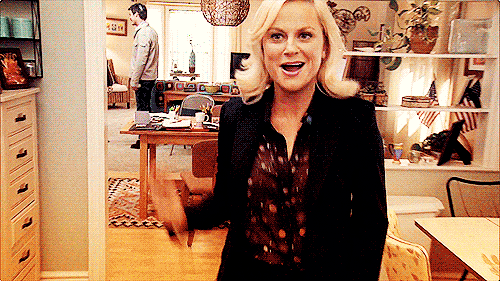Conclusion: The End
Written on Thursday, May 08, 2014 by Unknown

[via www.funnyjunk.com]
This is it. It's all finished. I can hardly believe it. Oh how time flies...
I feel very accomplished right now. Not Darcy's version of accomplished, but pretty darn close.
And one day I will come to love this question. Actually I kind of already do, now that it's all over anyway.

[via www.troll.me]
Too bad your grammar isn't as good as your face, Ryan.
Also, I feel like this moment calls for some kind of break-dancing gif or something.
Nope. Never mind. I found something better.

NO WAIT. This is a far more accurate representation of my feelings:

[via gifsoup.com]
Yep. That's the one.
So anyway, time to conclude. For real this time.
To recap: My thesis is about transmedia storytelling, particularly how it relates to web series. My artifact was The Lizzie Bennet Diaries (or LBD), a scripted transmedia web show composed of video blogs and a lot of social media. It was very popular and has inspired many similar creations. While it was my baseline and primary example, I was also interested in exploring transmedia in general and how it is a viable format for contemporary narratives. After some investigating I discovered that there is not a lot of literature on transmedia (or web shows for that matter) aside from a few history-type books, but they don't even go into the concept of transmedia that thoroughly. There are few to no theories on the subject but many people do see the potential of this type of narrative storytelling. Because it is so unique and often quite complex, traditional analysis could not be done. I attempted to come up with a new way of looking at transmedia (streams and barriers), but whether or not it is any good doesn't really matter. The point is that we do need a new way to analyze these types of projects (webseries and transmedia) that isn't as limiting as standard film and television criticism.
Well, why did I write about all of this?
For one, I love it. I find it all to be fascinating and I just love web shows. I think they are an emerging form of media that will eventually be the norm and I think it's so great that it isn't as limiting as TV and film. Almost anyone can make a web show. And the fact that it can easily spread and go viral is amazing. Your audience is much more accessible. Which leads to the main reason why I study transmedia, which is that I love the interactivity of it. I was never able to immerse myself into a show like the way I was able to with LBD. And that, for me, was a total game changer. I want all of my stories to be like that from here on out. It brings the narrative to a whole new level. Or levels.
While researching all of this, I quickly found out that not everyone is on the same brain train as me right now. They don't all share my passion, and frankly there are still not that many people who even know what transmedia is. I hope that in a handful of years this wont be the case, but for now it's webseries that is making a name for itself. Transmedia may have to wait in the wings a little while longer until it's time for the spotlight. Still though, I was a little shocked by the lack of materials out there. Perhaps it would behoove some academics to spread their wings a little and learn more about some emerging types of narratives. Because seriously folks, I really really want to know what people think about this stuff.
Other than research, I also learned quite a bit about transmedia through the process of actually writing this thesis. The first thing I learned is that transmedia is (to borrow from my professors vocabulary) wicked hard. This thesis was an experiment, and honestly I don't think my results were overwhelmingly successful. Not that the thesis itself is bad, but I don't think I really succeed when it came to "systematically dispersing elements across multiple delivery channels for the purpose of creating a unified and coordinated experience" (to borrow from Henry Jenkins). Almost all of my content was on this blog. Only one big part, my theory section, was done via different media and that was because it was a video. Otherwise, the twitter and facebook were rather useless and I just did not have time to make any other videos. So if I gained anything from this experience, it is some serious respect for content creators. Producing all of those elements and then managing all of those outlets is an incredibly difficult task. If I have any advice for future students that want to embark on a thesis such as this, it is: plan, plan, plan. If you want to make a transmedia thesis that is not only about transmedia, but is transmedia, then you need to make a calendar or something. Get organized and figure out how you're going to write and release it all. And find an awesome advisor who is open to trial and error. Props to my professor, who deserves some serious acknowledgements.
Other than research, I also learned quite a bit about transmedia through the process of actually writing this thesis. The first thing I learned is that transmedia is (to borrow from my professors vocabulary) wicked hard. This thesis was an experiment, and honestly I don't think my results were overwhelmingly successful. Not that the thesis itself is bad, but I don't think I really succeed when it came to "systematically dispersing elements across multiple delivery channels for the purpose of creating a unified and coordinated experience" (to borrow from Henry Jenkins). Almost all of my content was on this blog. Only one big part, my theory section, was done via different media and that was because it was a video. Otherwise, the twitter and facebook were rather useless and I just did not have time to make any other videos. So if I gained anything from this experience, it is some serious respect for content creators. Producing all of those elements and then managing all of those outlets is an incredibly difficult task. If I have any advice for future students that want to embark on a thesis such as this, it is: plan, plan, plan. If you want to make a transmedia thesis that is not only about transmedia, but is transmedia, then you need to make a calendar or something. Get organized and figure out how you're going to write and release it all. And find an awesome advisor who is open to trial and error. Props to my professor, who deserves some serious acknowledgements.
Speaking of my professor, she asked me three questions to consider while writing this conclusion.
1. Why was this important?
2. What does it teach us?
3. Where do we go from here?
Well, for #1 I would say it is important because it isn't going anywhere. Transmedia (and webseries) are here to stay. Almost all of the authors I read said the same exact thing. It may be slow burning, but it's catching on and they all couldn't wait to see what happens next. None of them knew what it meant for the future, but if I had to guess I'd say it also means some major changes for our culture and the way we experience stories. At least here in the US, current generations have been called passive and apathetic. But transmedia encourages participation and immersion, which will probably bleed into other areas of our lives as well - especially because not all transmedia has to be fiction. People want to interact, and they will. New technology and innovations will lead to a more active audience and perhaps a more active generation. And like many of those aforementioned authors, I also can't wait to see what happens. Hopefully I'll get to be a part of it.
Huh, I guess that kind of also answered #3 too. Well as for #2, I think it teaches us that we don't need to stick to the same old conventions and neither do our stories. As I said, people want to engage with narratives on a new level and both transmedia and web shows can provide people with that opportunity. It is exciting, fresh, and innovative. People can get closer to stories more than ever before and that is pretty remarkable.
I'm not sure what else it teaches us. Maybe in 20 years I'll have a better answer to that question. Once people start to take advantage of this medium and really put it to the test, then we will start to learn more. Maybe more about what it offers, what it can do, or what it means for entertainment as a whole. And not just entertainment, but the dissemination of information in general.
Maybe I'm just a little too enthusiastic, but I do hope that someday someone reads this and some of my enthusiasm can rub off on them.
But maybe by that time memes and gifs will be super outdated and old school. Just like those annoying "What people think I do/What I really do" memes. I've got to say, the rhetoric ones are really bad. Actually, 9% of the time any rhetoric gif or meme is going to be awful. What an unfortunate fact of life.
Time to wrap it up. Contrary to some of my previous posts where I stress out a lot over this thesis (I am just a lowly undergrad after all), I did have a blast writing it. Everyone else wrote long boring papers and I got to do a super fun blog about Lizzie Bennet! How awesome is that?!
Thank you so much to everyone who helped, encouraged, or simply tolerated me throughout this experience. And don't worry, I'll have a real thank you page up soon.
And here is one last gif just for fun.

[via rebloggy.com]
Over and out.
-Danny